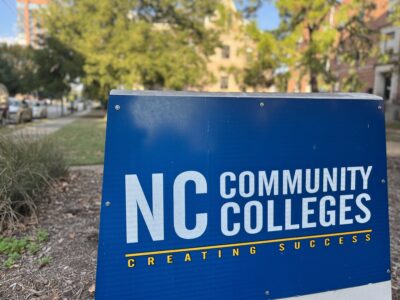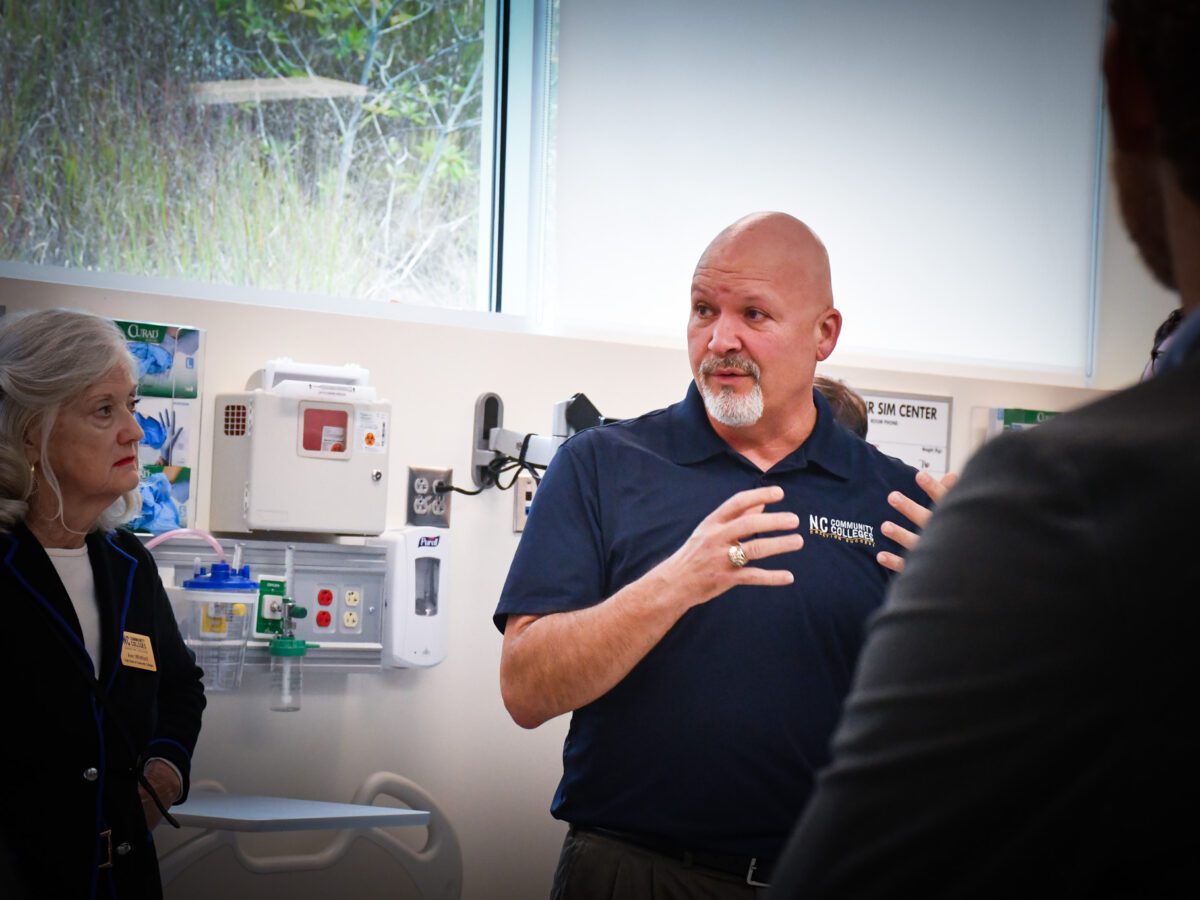
|
|
As the N.C. Community College System (NCCCS) awaits funding from lawmakers to enact the system’s new funding model, Propel NC, system leadership is working to make sure that policies, codes, and guidance to support local colleges is available if funding is approved.
“We want colleges to be ready to rock and roll,” said Alex Fagg, NCCCS director of government relations, at the State Board of Community College’s September meeting. “Because they’re the ones that ultimately are going to be dealing with bringing the students in and carrying out the change of funding model.”
Sign up for Awake58, our newsletter on all things community college.
The NCCCS requested nearly $100 million from the General Assembly this short session to implement Propel NC. While both legislative chambers included some initial funding for the model in their budget proposals, the General Assembly adjourned before passing an adjustment budget.
The mini budget passed by lawmakers earlier this month did not include that funding for Propel NC. Last week, NCCCS leaders said they will continue advocacy efforts but have heard great feedback from lawmakers and business leaders so far.
Ahead of the long session, the General Assembly meets next Oct. 9, Nov. 19-22, and Dec. 11-13.
“This (planning) shows that we’re taking this seriously on what this means to the system as we prepare and leverage this in our continued advocacy efforts with the General Assembly as we lead into the 2025-27 legislative session, which will begin in January,” Fagg said. “This is the highest priority of our system.”
The system asked for $93 million in recurring funds and $6 million nonrecurring associated with Propel NC. Here is a look at the main components of the request:
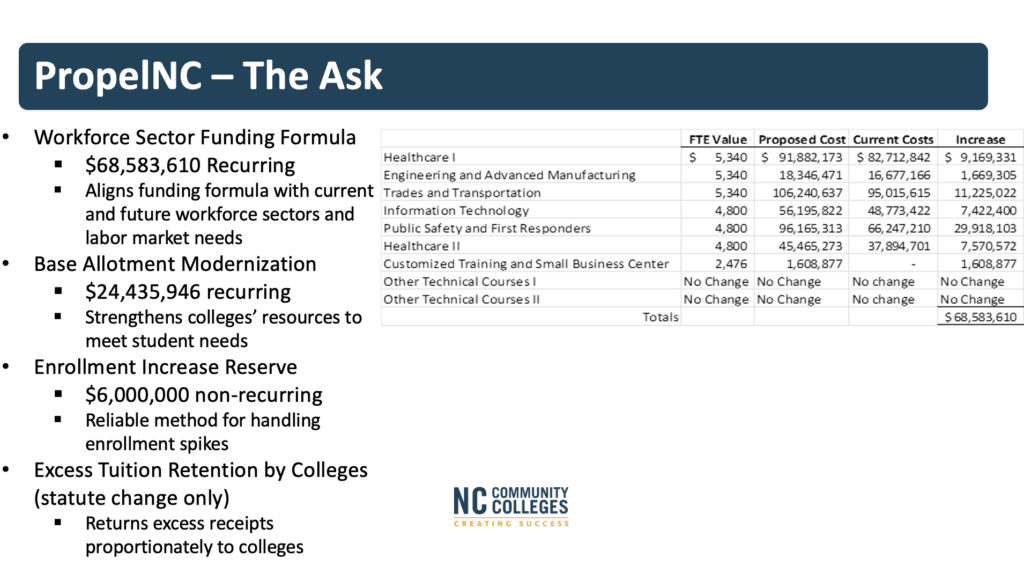
The system’s current funding model allocates resources to colleges in proportion to the number of full-time equivalent (FTE) students they enroll in each of their programs. Certain courses receive more state funds than others based on a four-tier funding model.
Propel NC would shift the current FTE funding tiers to “workforce sectors,” with courses ranked and valued by statewide salary job demand data every three years. All curriculum and continuing education (CE) courses would reside in the same workforce sector. The NCCCS says this shift “prioritizes connecting students to high-demand, high-wage jobs.”
The House and Senate budget proposals both included $18.5 million toward parity funding between curriculum and CE courses.
On Wednesday, Fagg said this funding would represent the “first phase” of implementing Propel NC. The system is still asking for $68.5 million to fully fund the workforce sector course values shift, he said, along with the increase in base allotment and one-time investment in enrollment increase reserve.
During the planning session, system staff presented a new labor market tool, which will be used to help finalize workforce sectors. That tool is expected to be made public later this fall. The system is also working to develop a tool that would collect information and promote short-term workforce programs across the state.
Board members also discussed the importance of a “one-college model,” where all college programs and student services are housed under one roof. This approach, Board members said, makes it much easier for students and families to access information and enroll in programs, which is key to the success of Propel NC.
Along with working to update procedures and other internal policies — expected to be complete by February — the system and Board will also continue advocacy around Propel NC, Fagg said.
“We’ve built tremendous momentum over the last year with this Propel NC business model,” NCCCS President Dr. Jeff Cox said. “We’re really going to have to double down on our efforts there to get it across the finish line during the long session.”
Read more about Propel NC
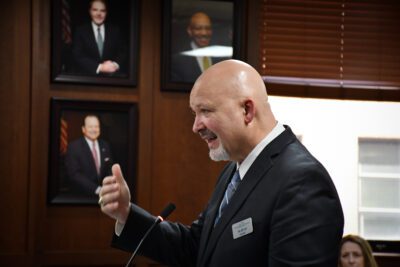


Touring Haywood Community College
Haywood Community College hosted the Board’s planning retreat and meeting from Sept. 18-20.
Multiple local leaders talked about the importance of understanding local needs and contexts.
The reason you do what you do is because you know the importance of home and communities, Canton Mayor Zeb Smathers told Board members.
“The people of these communities matter,” he said.
Smathers led Board members and retreat attendees on a tour of Canton discussing the resiliency of the community. Canton and surrounding areas have endured a number of crises over the past few years, including a deadly flood in 2021 and the paper mill closure in 2023 — which forced a layoff of over 1,000 employees.
Smathers praised the work of Haywood Community College leaders who implemented a rapid response system to serve employees impacted by the paper mill’s closure.
During her welcome, President Dr. Shelley White briefed Board members on the college’s response during the flood and its engagement with the community reeling from layoffs.
White, who wrote an EdNC perspective about the importance of community engagement, shared the following video, created by Robert Kinlaw, with the Board.
The State Board of Community Colleges’ (SBCC) retreat also included a campus tour. Board members visited the college’s health sciences building to learn about the simulation lab and experienced virtual reality tools that are used across numerous programs on campus.
“You all have done a tremendous job of making us feel welcome and really showing us what a community college means to the community it serves,” Cox said to White and her team.
After Thursday’s meeting, Board members had the opportunity to engage with forestry management technology students who led the Board on a tree identification tour around campus.
That evening, Haywood Community College’s lumberjack team showed off their competition skills. The lumberjack team will compete on Oct. 5 during the Woodmen’s Meet at the Cradle of Forestry. They will be joined by several other institutions, including Wayne and Montgomery community colleges.
Strategic planning across the NCCCS
The first two days of the Board’s planning retreat included several discussions about the system’s strategic plan, approved in fall 2022.
During his report to the Board, Cox said there have been “over 20 substantive changes to the system office’s structure,” meant to make the system more effective at serving the state’s colleges.
“Folks, this is an amazing amount of transition and transformation,” Cox said.
Here is a look at the changes Cox highlighted on Wednesday.
Board Chair Tom Looney emphasized the need for the system to continue adapting to serve students and the state well.
Operationally, he said the system must prioritize system modernization and data-driven decisions, awareness and engagement, labor market driven offerings, and scalable funding sources.
When interacting with colleges, businesses, and communities, Looney said the system’s guiding principals must be innovation with impact, business-drive partnerships, radical student success, and agility and adaptability.
“What we’ve done in the past won’t work,” Looney said.
The Board’s planning retreat also included discussions on system innovation, modernizing technology and business model, and deploying an integrated marketing strategy.
All of these strategies, Looney said, are part of helping the system accomplish its goal.
“NCCCS will be THE national model for facilitating postsecondary access and success through data-informed decision-making,” Wednesday’s presentation said.

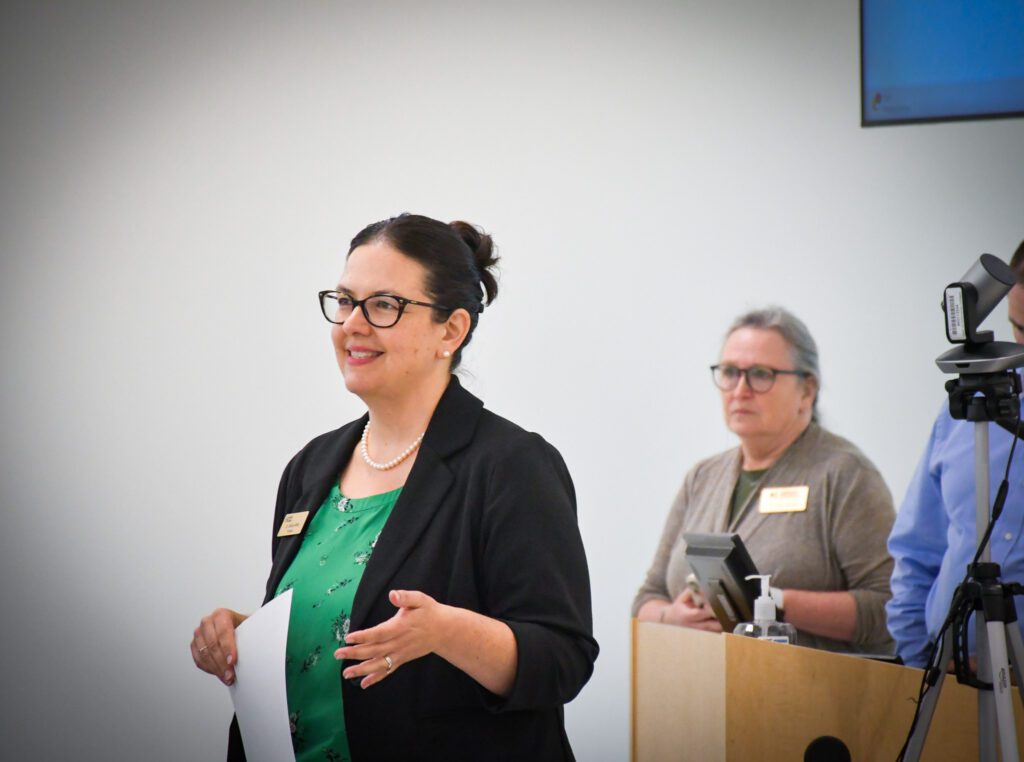

Career and college supports
The Board discussed an annual report on North Carolina’s Career and College-Ready Graduate Program, which must also be approved by the State Board of Education (SBE).
In 2015, lawmakers passed legislation requiring SBE and SBCC “to develop a program that introduces the college developmental mathematics and developmental reading and English curriculums in the high school senior year and provides opportunities for college remediation for students prior to high school graduation.”
That program is the Career and College-Ready Graduate (CCRG) Program, which is a partnership between the Department of Public Instruction and NCCCS. The program includes training, technical assistance, and professional development for local school districts.
The 2023-24 report, discussed last week, includes data on CCRG test completions and key findings from a state survey and regional focus groups.
Here are program outcomes included in the report:
In order to receive credit to enter North Carolina’s community colleges remediation-free, students must complete the math and/or English Tier Tests with an 80 or higher. Below indicates the pass rate for CCRG English and CCRG math:
- English Tier Test Completions:
- Among students who took the English CCRG content, 1,407 of students passed the English I tier tests and 590 passed the English 2 tier tests.
- That equates to a 24% pass rate for English 1 and 18% pass rate for English 2.
- For English 1, that is a 14% increase and for English 2, that is a 13% increase from the previous academic year (2022-2023).
- Math Tier Test Completions:
- Among students who took the math CCRG content, 5,412 of students passed the Math 1 Tier Tests, 4,286 passed the Math 2 Tier Tests, and 3,560 passed the Math 3 Tier Tests. That equates to 89% pass rate for Math 1, an 86% pass rate for Math 2, and an 89% pass rate for Math 3.
- For each of the tier tests—Math 1, Math 2, and Math 3—that is a 3% increase from the previous academic year (2022-2023).
The report included the following recommendations for the program moving forward:
- Continued collaboration between the Department of Public Instruction (DPI) and NCCCS.
- A review of eligibility criteria to increase access and equity based on the needs of students.
- Continued funding to support the CCRG implementation.
- Continue communication with constituents for strong implementation.
- Continue consideration of how CCRG English can be implemented more effectively.
“The NCDPI and NCCCS staff will work collaboratively to ensure greater communication to LEAs (Local Education Agencies) about the intent and benefits of CCRG to ensure greater access and opportunity to all subgroups,” the report says. “This annual report presents a comprehensive evaluation of the CCRG program’s outcomes and demonstrates the program’s effectiveness.”
The Board also discussed an annual report on the state’s career coach program, which according to the report, “places community college Career Coaches in high schools to assist students with determining career goals and identifying educational pathways enabling students to achieve these goals.”
The program, which was started in 2015, has received funding from the General Assembly.
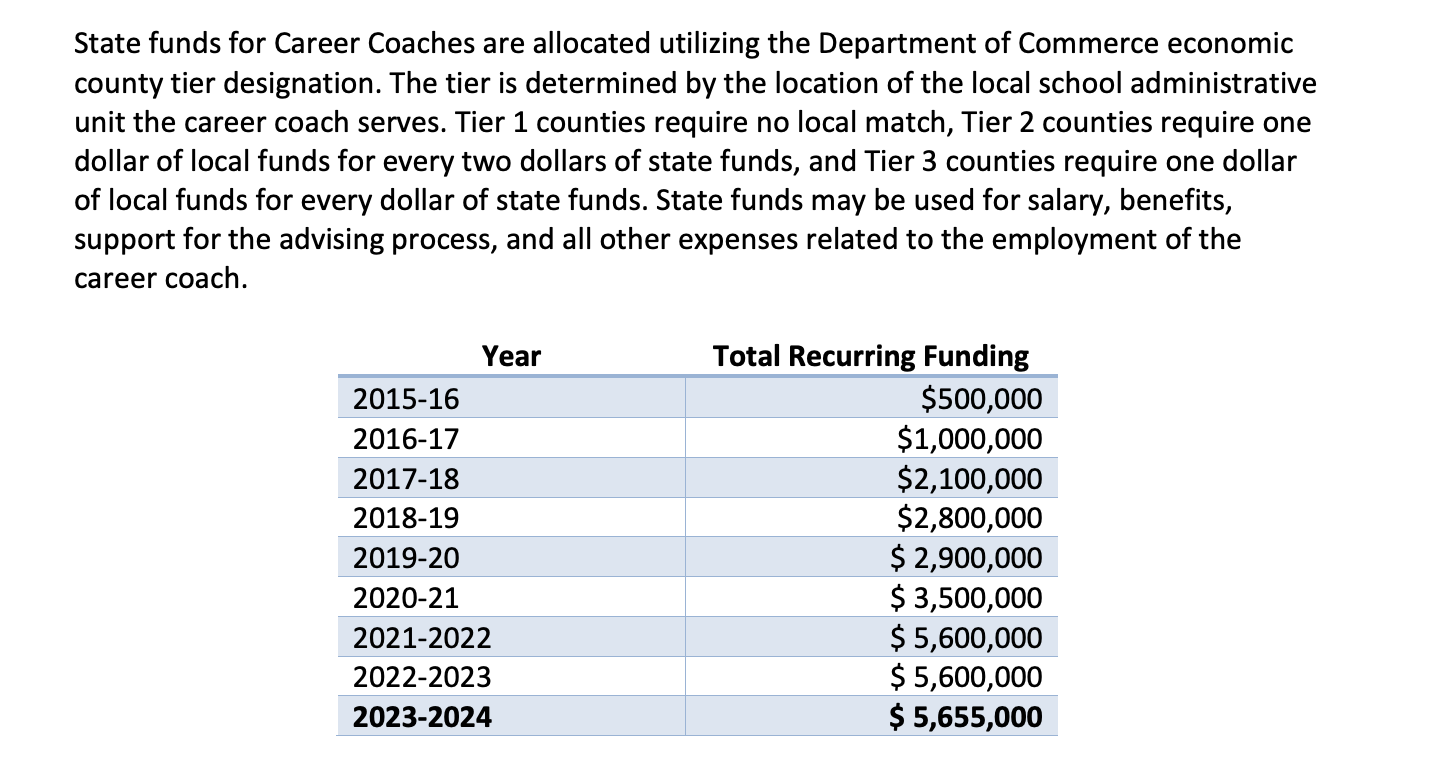
During the 2023-24 academic year, there were 91 career coaches at 45 community colleges — serving more than 20,000 students, according to the report.
“Individual student engagements over the year totaled 31,841,” the report says. “While the Career Coach Program has grown and demonstrated success, barriers to on-going success continue. These barriers consist of the difficulty of consistent PowerSchool access for data collection and staff turnover.”
Another challenge listed in the report is the match requirement for small, rural colleges. Board members discussed the need to study and promote why having career coaches matters, in an effort to advocate for more funding.
“We want to be able to say what the benefits of career coaches really are,” said Shirley Carraway.
The report includes data on student engagement, employer engagement, and pathway enrollments.
“The NC Career Coach Program is successfully helping high school students to choose a viable career path,” the report says. “Although there are only ninety-one (91) Career Coaches statewide, there is broad deployment and strong engagement with coaching students as evidenced by student enrollment in both high school and community college pathways.”

Presidential finalists, student activity fees, ApprenticeshipNC report, and more
- The Board approved three presidential finalists at Richmond Community College, to be announced by the college. During the meeting, it was also announced that Rockingham Community College President Dr. Mark Kinlaw will be retiring.
- The Board approved an amendment that will allow local colleges to increase their student activity fees up to $50 per academic term, from a previous limit of $35. That fee has not been increased in nearly 15 years. The Board also reviewed two public comments in support of the amendment, which will be effective Oct. 1.
- During the 2023-24 fiscal year, the community college system served 15,090 apprentices, according to an annual ApprenticeshipNC report approved by the Board last week. There were nearly 5,000 new apprenticeship enrollments last year, 147 new apprenticeship programs, and 3,525 employers served.
- The Board approved an allocation of $2.7 million in High-Cost Workforce Start-Up funding and $2.2 million in High-Cost Workforce Expansion funding to support the start-up and expansion of health care workforce programs across the state. To receive the funding, allocated in the 2023 budget, colleges must match a percentage of the total cost of the program with non-State funds. You can view the colleges and programs set to receive funding here.
- The 2023 budget allowed for the establishment of an in-state tuition pilot program at Tri-County Community College for up to 100 residents from four Georgia counties bordering North Carolina: Fannin, Rabun, Towns, and Union. During the 2024 academic year, that program enrolled 62 out-of-state students, according to a report discussed by the Board.
- Finally, the Board also approved “an amount not to exceed $4,000,000 for a thirteen-month contract for full-time resources to assist the ERP modernization team with the current state and the future state ERP.”
The full Board is scheduled to meet next Oct. 17-18.
Recommended reading

